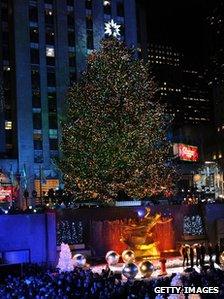War on Christmas: Is the festival under attack?
- Published
- comments

Dozens of US congressmen have pledged to protect Christmas from attempts to undermine it. So is the West's foremost public holiday really under attack?
One of the most famous family scenes in history, the nativity, appears to be facing threats from all sides.
A tug of war is going on over a nativity setting on a courthouse lawn in Texas, with the Freedom from Religion Foundation urging it be removed or an atheistic solstice banner put up nearby. In South Carolina, a state hospital has banned a nativity scene from its premises.
It's part of a wider assault on the Christmas tradition, say some Christian groups, who also point to a rule barring congressmen from sending Christmas cards through the official congressional post.
Theirs is a very modern crusade over the place of religion in public life that has been taken up on both sides of the Atlantic. In the UK, rumours the very name "Christmas" had been replaced in some places by "Winterval" provoked outrage.
Now the US Congress has joined the fight. A non-binding resolution, external sponsored by 67 Republicans and Democrats expresses "the sense of the House of Representatives that the symbols and traditions of Christmas should be protected for use by those who celebrate Christmas".
The resolution "strongly disapproves of attempts to ban references to Christmas" and "expresses support for the use of these symbols and traditions by those who celebrate Christmas".
It was never brought up for a vote, in part because Congress has been consumed with fights over taxes and the budget. But it has sparked debate.
"In recent years, there has been an effort by some to ban any reference to Christmas by the federal government or our elected officials," Arkansas Democratic Congressman Mike Ross wrote to supporters, external on Monday.
"While I certainly respect the US Constitution... it does not expressly ban any mention of religion or reference to God, Christianity or Christmas by practising Christians."
In wading into the debate, Congress joins a coalition of conservatives who say they are fighting to save Christmas from, say, shopkeepers who would offer discounts for the "holiday season" rather than for Christmas alone.
In Anchorage, Alaska, a group was planning to converge on city hall to hold a carol-singing protest in defence of Christmas customs they believe to be under threat, such as the habit of wishing someone "Merry Christmas" instead of "Happy Holidays".
Republican presidential contender Rick Perry used a recent advert to complain that children could no longer celebrate Christmas openly, and that President Obama had launched a "war on religion".
Last week, Pastor Nathan Lorick of the First Baptist Church of Malakoff, Texas led a rally of about 5,000 Christians to defend the right of a courthouse to display the nativity scene while forbidding a banner celebrating solstice.
"Each year, as you sit back and watch, the attacks on Christmas are becoming more and more prevalent," says Mr Lorick.
"We found an opportunity here to stand up and address the issue that's going on nationwide, an ever-intensifying persecution of Christianity in America."
Members of the Freedom from Religion Foundation, who want the display removed, insist they are not out to rid Christianity from public life, but want to enforce the separation of church and state.
"Either they take the nativity scene down because it's there as a sole-focus display, or they truly have a public forum and they allow us to put our sign up too," says co-president Annie Laurie Gaylor.
"Nobody is talking about banning nativity scenes in church lawns and private homes."
'Winterval' v 'Christmas'?
The same debate has been aired in the UK. On Thursday, it was reported that Christmas decorations had been banned at a government office by "Scrooge pen pushers" who said they were inappropriate in a "diverse workplace".

You can't escape Christmas in New York
That kind of clampdown was on the mind of Communities Secretary Eric Pickles last year, when he criticised unnamed town councils that he said had toned down their Christmas themes for fear of causing offence.
"We should actively celebrate the Christian basis of Christmas, and not allow politically correct Grinches to marginalise Christianity and the importance of the birth of Christ," he said on his website, external.
Some of the stories about a "war on Christmas" have turned out to be more complicated than initially thought. One newspaper printed a correction last month, external after wrongly reporting that Christmas had been renamed "Winterval" in parts of the UK. There was an instance in 1998 when Birmingham City Council was criticised by church leaders for calling a series of religious and secular events "Winterval", but it said Christmas still played a part within that programme of events.
And a story that government bureaucrats had suddenly banned congressmen from writing "Merry Christmas" in official constituent communications was actually due to a policy inscribed in a federal law, external that bars official mailings offering "holiday greetings" and other personal notes. The rule dates back at least as far as 1974, and forbids members, external sending birthday, anniversary, retirement or similar greetings in official mail.
But if anyone is fighting against Christmas, they seem to be losing the battle. Indeed, polls indicate the vast majority of Americans celebrate the holiday, external, with most incorporating religious elements into the observance.
"We're inundated with Christmas," says Max Brantley, a journalist and political analyst in Arkansas who has followed Mr Ross's career.
"Christmas is not in danger, and the notion that the US congress needs to waste time with a resolution that asserts it's in danger is just silly."
But many believe there is a battle to fight, to preserve the Christian traditions, and it's a conflict in which they are in ascendancy, with the vast majority of people on their side.
"The tide is turning," says Andrew Marsh, spokesman for Not Ashamed, a UK campaign founded last year by former Archbishop of Canterbury Lord Carey to reinvigorate public Christianity in Britain.
"This year, I have been encouraged. The vast majority of the public are sympathetic to the Christian message at Christmas time. Some of the attacks seem small minded and scrooge-like."